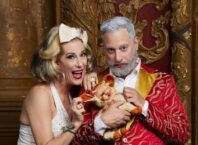RSPCA shops in the Hillingdon area of London have got into the VE Day spirit – as the animal welfare charity marks the 80th anniversary of the end of the Second World War in Europe.
The three shops in Hillingdon, Cippenham and Denham have decked out their windows and displays with Union Flags and memorabilia to mark the occasion today.
Volunteers have dressed up in wartime clothes and the shops are selling their traditional goods alongside patriotic items.
Jenny Hodge, a volunteer at the branch, said: “The RSPCA helped save 256,000 animals from places like destroyed buildings during the Second World War. The charity’s heroic frontline officers also rescued pets during air raids; and it’s important we honour their actions while at the same time marking such an important day in our history.”
To help ensure this work and the lives of animals lost during the war is not forgotten, the RSPCA has also set up a special exhibition featuring war-time records, photographs, stories and leaflets at RSPCA Southridge in Potters Bar – which is now open to the public.
They hope to add to the collection to highlight more untold stories of dedication, courage and sacrifice in helping animals in war-time Britain.
Dr Mark Trewin, archivist for the charity, said: “We have unearthed some amazing documents including leaflets, letters, photographs and posters all which help piece together just what was happening as war ravaged the country.
“There are some truly heart-warming stories of bravery and togetherness involving animals and their rescuers and we are keen these are preserved and added to as we hope they inspire today’s society to build a world which treats animals with kindness and respect.”
The charity has also released historic footage showing the RSPCA in action during World War II. Meanwhile, newly unearthed archive documents reveal many emotive stories of bravery during this six year period of fighting.
The film, ‘Their Safety is Your Trust’ released by the RSPCA during the conflict, gives a glimpse of the work carried out during this time – with animals found injured in bombed homes being dug free by inspectors using their bare hands and those terrified pets found missing during the chaos being reunited with their families as the war continued to rage until Victory in Europe Day.
Archive material from the charity also cites the key role played by animals in the war – such as carrier pigeons transporting urgent messages to protect troops from attack, horses and donkeys who helped carry supplies, and search and rescue dogs digging injured civilians from the rubble of their destroyed homes.
As well as pets caught up in bomb damage, the charity’ s rescuers were involved in saving livestock in need of rescue after keepers and farmers were tragically killed, extra inspectors were also drafted in to help sea birds affected by oil from submarines and during this period the RSPCA had established 734 animal rescue centres to deal with the casualties.
In total the charity rescued and treated over 256,000 animal victims of enemy action, in addition to more than one million animals suffering from general injury and sickness.
Mark added: “This landmark 80th Anniversary of VE Day is a time to reflect on the human and animal pain, distress and losses caused throughout the conflict.
“Sadly five RSPCA officers lost their lives during WWII as they battled to save animals in need and we want to remember their heroic actions.
“Some of the stories and memories we have unearthed from our archives about our colleagues and animal friends back during these horrific and challenging times are truly inspiring, and really do reflect the British spirit and their love for animals.
“We must also remember those animals who knew nothing of the situation in which they were placed or the dangers they faced, but played a pivotal role in helping to secure Victory in Europe – for example carrier pigeons delivering urgent messages to the frontline or those who were carried on bomber flights so if the aircraft was shot down they would be released and carry location messages back to base.
“Animals are amazing and this VE Day we’re asking people to find out how they can do their bit with the RSPCA to create a better world for animals and people
Some of the animal stories uncovered in the RSPCA archives include:
One emotive story from the archives includes the death of an RSPCA centre manager during a bombing raid – but days later his pet cat was found wandering the streets by one of the charity’s inspectors and traced to his grieving family – providing them with some comfort during difficult times.
William Knowles (1893-1940), was Resident Manager of RSPCA Southwark Clinic, which was part of the National Air Raid Precautions Animal Committee (NARPAC) – a scheme providing rescue and treatment for animals, especially as a result of air-raids.
The clinic was one of several which were themselves destroyed in high explosive bombing raids, in this case killing Mr Knowles who is believed to be the first fatality among RSPCA staff as a result of enemy action.
Remarkably, a stray cat was collected a few days later in Central London and was taken to the RSPCA. It was identified as belonging to Mr Knowles thanks to the NARPAC pet ID tag it was wearing. The cat (pictured with the RSPCA inspector) was able to be reunited with Mr Knowles’ widow and children, who managed to escape alive and gave great comfort to the family during such a dark time.
Patriotic Parrot rescue
In a letter from an RSPCA inspector, details emerged of an evacuated house in Hull where a bomb had dropped and the concerned rescuer who was checking on the property could hear someone shouting ‘Rule Britannia, Britannia Rules the Waves’.
On investigating in a back room he found the source of the patriotic words – a pet parrot left behind as the family had to be evacuated. He took the parrot to a rescue centre until his family reclaimed him – and during his time in rescue he continued to shout the words defiantly.
Dog saves baby by digging air pocket
A dog named Peggy was given an inscribed collar by the RSPCA in recognition of her life-saving actions of her family’s baby.
When a bomb was dropped on the home in East Anglia, rubble, debris and dust covered the pram, and though Peggy had a route of escape, she stayed and jumped onto the pram and began furiously digging a hole through the rubble leaving a gap for the baby to breathe. Mother, child and Peggy all escaped with their lives.
Dog saves trawler ship crew in icy waters by kissing them
A naval dog called Daisy was also given a special collar from the charity (pictured right) after her trawler ship was bombed and crew were flung into the ice cold sea – and she gave them her own version of the kiss of life.
Daisy swam from crew member to crew member licking their faces through the night, keeping them awake and positive, until all were rescued and brought to Newcastle. Daisy went on to have two puppies and lived out her days at a seaman’s hostel in the city.
As well as the bravery of animals our rescuers were also crucial life-savers.
In 1940, 37 silver medals were awarded to our inspectors who risked their lives carrying out animal rescues in areas barred to the public because of delayed time bombs. Of the animals rescued from bombed sites, 10,100 pets sadly had to be put to sleep due to injury, but 5,940 animals survived and were successfully rehomed.
Inspectors were well known locally, and many were contacted by injured people from hospital, desperately asking them to search the ruins of their bombed homes to find their beloved pet – including cats, dogs, tortoises, rabbits and more. Many animals were successfully recovered by these brave inspectors (pictured right.)
One particular inspector crossed danger cordons into a row of homes evacuated due to a number of dropped time bombs, in search of missing pets. He recovered three cats, two dogs and a cage of budgies to safety.
A number of male and female RSPCA ambulance drivers risked their lives during the war collecting injured animals from across towns and cities.
On Christmas Eve 1940 an inspector in Southsea recovered hens, rabbits, a canary, a jackdaw and several terrified cats from a bombed home and Anderson shelter, taking them all back to his home on Christmas morning where he cared for them for several days.
During 1942 alone, £27,000 worth of supplies were dispatched to other countries such as Greece, Russia and Australian cavalry operating in Syria and Lebanon to help the people care for injured or needy animals.
Pictured (right) is a thank you telegram from the Russian Red Army for the RSPCA support in helping their animals. Leaflets unearthed also show how the RSPCA also fund-raised to help Finland care for their horses and reindeer who were used as part of the war effort.
At home crucial work continued in RSPCA clinics even those which were damaged by bombs continued in their efforts with staff setting up a table outside to carry out treatments in the open air. Hospitals at Southwark, Bristol and Manchester were completely destroyed. The former headquarters at 105 Jermyn Street, London, suffered bomb damage too.
Funds were raised for the ‘War Animals Allied Fund’ by the RSPCA of which Clementine, wife of Prime Minister Winston Churchill, was the vice president of and wrote to the charity thanking them for their continued work (right).




